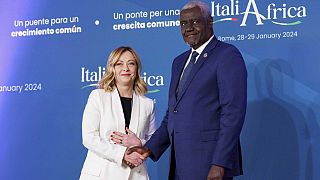
Latest News Regarding
Horn of Africa
Italy’s Meloni opens Africa summit to unveil plan to boost development and curb migration
The European Council has adopted sanctions against six entities involved in the war in Sudan. The horn of Africa nation’s regular army (SAF) and the paramilitary Rapid Support Forces (RSF) have been fighting since last April.
Source: 23 January 2024, The European Council has adopted sanctions against six entities involved in the war in Sudan. The horn of Africa nation’s regular army (SAF) and the paramilitary Rapid Support Forces (RSF) have been fighting since last April.
The Council said in a statement Monday that the six entities were responsible for “supporting activities undermining the stability and political transition of Sudan”.
Among those listed are two companies involved in the manufacture of weapons and vehicles for the SAF (Defense Industries System and SMT Engineering).
The bloodshed in Sudan has continued to escalate despite international attempts to forge a lasting ceasefire. The war has uprooted more than 7.5 million people from their homes and created a humanitarian crisis.
In November, the European Union condemned an escalation of violence in Sudan’s Darfur region, warning of the danger of another genocide after conflict there between 2003-08 killed some 300,000 people and displaced more than two million.
India’s navy rescues second Iranian-flagged fishing boat hijacked by Somali pirates
India’s navy rescues second Iranian-flagged fishing boat hijacked by Somali pirates

Source: AP, Tuesday January 30, 2024
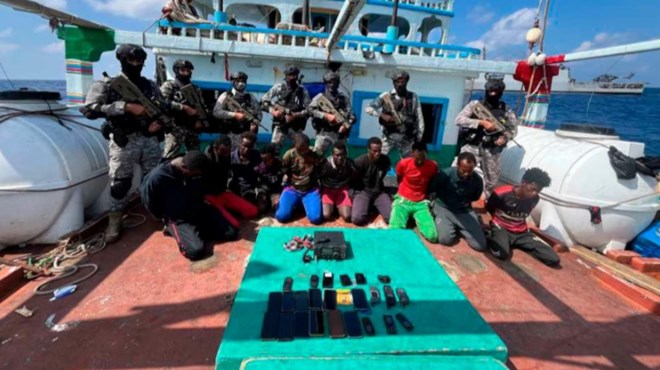
This photograph provided by the Indian Navy shows armed naval commandos standing behind 10 captured Somali pirates with their hands tied behind after they thwarted a piracy attempt on the Iranian flagged fishing vessel Al Naeemi off the east coast of Somalia, Monday, Jan.29, 2024. According to a navy statement Tuesday, Indian naval ship Sumitra intercepted the vessel and freed its 19-member Pakistani crew. The navy did not immediately say what had happened to the pirates. (Indian Navy via AP)
NEW DELHI — India’s naval forces rescued an Iranian-flagged fishing vessel hijacked by Somali pirates and freed its 19-member Pakistani crew off the east coast of Somalia, a navy statement said Tuesday.
The rescue operation was the third this week involving Somali pirates and came a day after India’s forces freed another Iranian fishing vessel named Iman and its 17 crew members from Somali pirates in the same waters. On Saturday, the Seychelles’ defense forces and coast guard rescued six Sri Lankan fishermen whose vessel had been hijacked by Somali pirates.
The Indian navy’s latest operation rescued the Iranian vessel Al Naeemi from the pirates late Monday. The ship intercepted the vessel and forced the pirates to release the crew and boat, which 11 Somali pirates had boarded, the statement said.
The navy did not immediately say what happened to the pirates responsible for the hijacking. But it posted images showing 10 pirates with their hands tied behind them and armed Indian naval troops guarding them. Another image showed some armed pirates on the vessel.
The piracy occurred in international waters about 850 nautical miles (1,570 kilometers) west of the Indian coastal city of Kochi.
Amid disruptions in global shipping due to attacks by Yemen-based Houthi rebels in the Red Sea since November, the Indian navy has ramped up its deployment by sending three guided missile destroyers and reconnaissance aircraft to the vast Indian Ocean.
They have carried out several anti-piracy missions in addition to helping at least four merchant vessels that were attacked in the high waters amid Israel’s war with Hamas.
Somali president discusses Ethiopia-Somaliland conflict with AU chairman in Rome
Somali president discusses Ethiopia-Somaliland conflict with AU chairman in Rome

Source: Hiiraan Online, Tuesday January 30, 2024
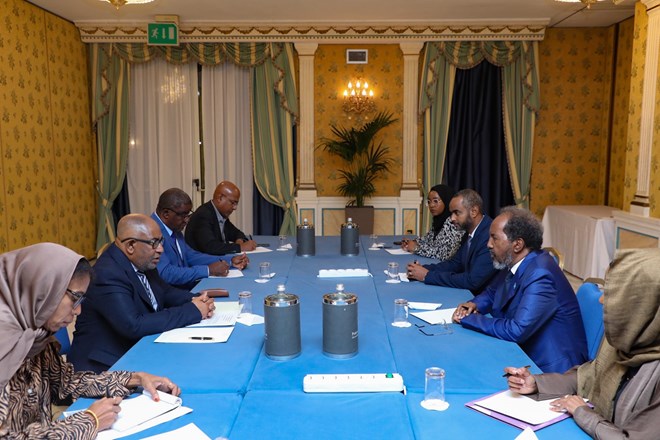
Mogadishu (HOL) – Amidst increasing tensions in the Horn of Africa, Somali President Hassan Sheikh Mohamud met with the African Union Chairman and Comoros President Azali Assoumani at the Italy-Africa Summit in Rome.
The meeting comes in the wake of a controversial Memorandum of Understanding (MoU) signed between Ethiopia and the self-declared autonomous region of Somaliland. The MoU, allowing Ethiopia access to the Red Sea port of Berbera, has raised significant concerns over regional stability and security. Somalia has vehemently opposed this agreement, declaring it null and void, and has recalled its ambassador to Ethiopia. According to sources, Somalia’s firm opposition to the agreement formed the backdrop of this high-level engagement.
In response to the rising tensions, the African Union Peace and Security Council (PSC), at its 1192th meeting on January 17, expressed deep concern. The Council emphasized the importance of respecting the unity, territorial integrity, and sovereignty of all its member states, including Ethiopia and Somalia.
Moussa Faki Mahamat, Chairperson of the African Union Commission, has urged both countries to engage in peaceful negotiations, stressing the need for mutual respect and adherence to the principles of good neighbourliness. This call for dialogue and restraint is seen as vital for maintaining peace and stability in the Horn of Africa.
Ethiopia’s Prosperity Party commits to transforming MoU with Somaliland into ‘practical agreement’
Ethiopia’s Prosperity Party commits to transforming MoU with Somaliland into ‘practical agreement’
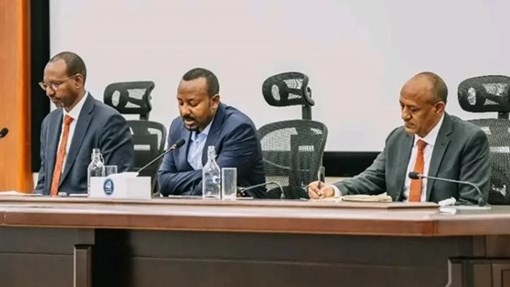
Source: Hiiraan Online, Mogadishu (HOL) – Following a four-day assembly, Ethiopia’s ruling Prosperity Party (PP) has vowed to advance its contentious Memorandum of Understanding (MoU) with Somaliland into a “practical agreement.” This commitment, made by the party’s Executive and Central Committee members, has sparked significant regional tension, particularly with Somalia.
UAE Is Major Player in Horn of Africa
UAE Is Major Player in Horn of Africa
Source: World Politics Review published on 23 January 2024 an analysis titled “The UAE Has Become a Major Player in East Africa. That’s a Problem” by Jonathan Fenton-Harvey.
The UAE is promoting “authoritarian stability” in the Horn of Africa by investing widely and supporting movements such as the paramilitary Rapid Support Forces in Sudan. It also provided drones to the Ethiopian government in its battle against Tigray Region.
Egypt Supports Somalia after Ethiopia-Somaliland Deal
Source. The National published on 21 January 2024 an article titled “El Sisi Warns Ethiopia over Somaliland Red Sea Deal” by Hamza Hendawi.
Following a visit to Cairo by Somali President Hassan Sheikh Mohamud, Egyptian President Abdel Fattah el-Sisi said Egypt will not allow any country “to breach or threaten Somalia’s security.” This was in reference to the Memorandum of Understanding announced earlier by Ethiopia and Somaliland
Somali President Mobilizing Support Against Ethiopia-Somaliland Deal
Somali President Mobilizing Support Against Ethiopia-Somaliland Deal
Source: Al-Monitor published on 23 January 2024 an article titled “Somali President Visits Qatar, Egypt Amid Row over Somaliland-Ethiopia Deal” by Beatrice Farhat.
Somali President Hassan Sheikh Mohamud has been visiting Eritrea, Egypt, and Qatar to build support for opposing the Memorandum of Understanding between Ethiopia and Somaliland. He appears to be making progress in achieving this goal.
Impact on Somalia and Somaliland of Ethiopia-Somaliland Deal
Impact on Somalia and Somaliland of Ethiopia-Somaliland Deal
Source: by Caleb Weiss, Bridgeway Foundation, and James Barnett, Hudson Institut, War on the Rocks published on 24 January 2024 an analysis titled “A Port Deal Puts the Horn of Africa on the Brink” by Caleb Weiss, Bridgeway Foundation, and James Barnett, Hudson Institute.
This analysis focuses on the implications of the Ethiopia-Somaliland Memorandum of Understanding (MOU) on the internal situation in Somalia and Somaliland. It acknowledges that neither Somalia nor Somaliland has the ability to wage a conventional war against any potential opponent. The al-Qaeda-linked al-Shabaab terrorist movement in Somalia and the Somali government oppose the MOU. Al-Shabaab sees the MOU as a way to mobilize additional support for its goals from the wider Somali population. The MOU has also upended politics in Somaliland.
Suicide bombing kills at least 2 in Somali capital
Suicide bombing kills at least 2 in Somali capital

Source: AA, Thursday January 25, 2024
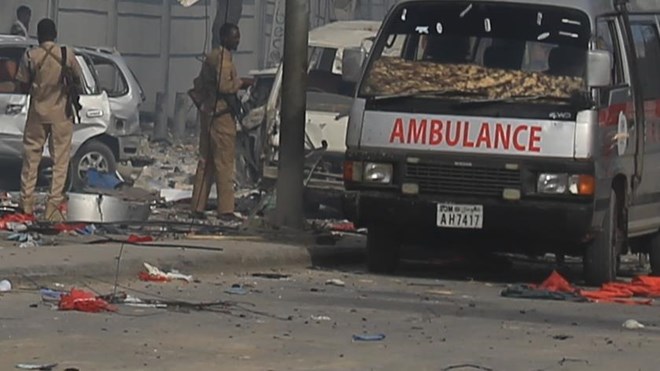
At least two civilians were killed and two wounded in a suicide attack Wednesday at a busy intersection in the Somali national capital of Mogadishu, according to police.
The attack involved a lone bomber who detonated explosives vests near a petrol station 1 kilometer from Mogadishu’s soccer stadium, police said in a statement.
The stadium was hosting a match where thousands of spectators were inside. The statement said the bomber exploded as the security personnel were chasing the attacker.
The al-Qaeda affiliated terror group, al-Shabaab. claimed responsibility for the attack — the second in the Horn of Africa nation in less than 24 hours.
Earlier Wednesday, the group launched predawn attacks on an army base.
Heavy gunfire was exchanged during the multi-pronged strike on the base in northern Mudug province, according to officials.
The group said it attacked bases housing 1,350 soldiers and killed more than 191.
Somalia has been plagued by insecurity for years, with the main threats emanating from al-Shabaab and the Daesh/ISIS terror groups.
Since 2007, al-Shabaab has been fighting the Somali government and the African Union Transition Mission in Somalia (ATMIS) — a multidimensional mission authorized by the African Union and mandated by the UN Security Council.
The terror group has stepped up attacks since Somali President Hassan Sheikh Mohamud, who was elected for a second term in 2022, declared an “all-out war” on the terror group.
President Mohamud in Garowe for Puntland leader’s inauguration

Source: Hiiraan Online , Thursday January 25, 2024
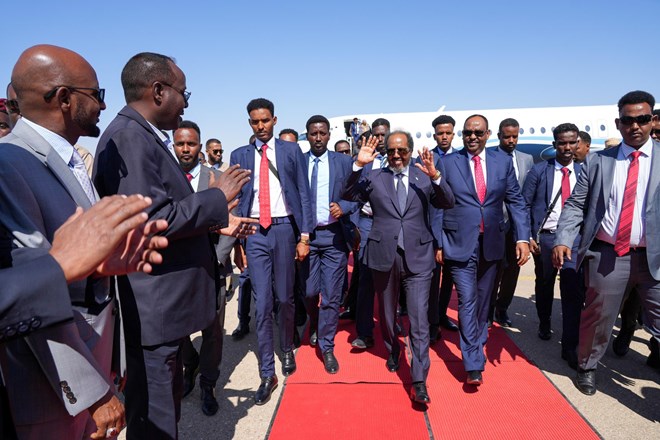
Garowe (HOL) – Somali President Hassan Sheikh Mohamud has arrived in Garowe to attend the inauguration ceremony of Puntland President Said Abdullahi Deni, scheduled for Thursday.
Former leaders, politicians, the President of Hirshabelle Ali Guudlawe, Galmudug’s Vice President, and a Jubbaland and Southwest delegations are already in the city.
President Hassan Sheikh and Said Abdullahi Deni have had a strained relationship recently, with Puntland boycotting the recent meeting of the National Consultative forums, where significant political decisions were reached. However, Puntland opposed all the decisions made during the forums.
Political analysts believe that President Hassan’s participation in the inauguration ceremony of the Puntland President indicates a possible reconciliation, allowing the two sides to initiate talks and work towards resolving the longstanding political conflict.
Somalia rejects mediation efforts with Ethiopia over port deal

Source: Friday January 19, 2024
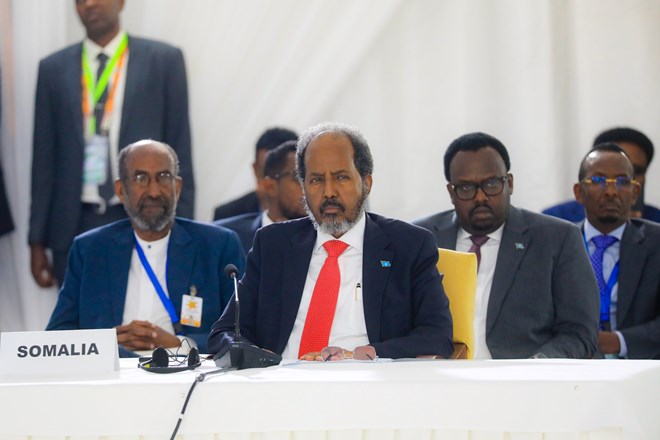
Somalia rejected any discussions with Ethiopia about Addis Ababa’s agreement to lease a port in the breakaway region of Somaliland, as regional heads of state gathered on Thursday to try to defuse a growing diplomatic crisis.
Under a memorandum of understanding signed on Jan. 1, Ethiopia would consider recognising Somaliland’s independence in return for gaining access to the Red Sea, partly through the port lease.
advertisementsSomaliland declared independence from Somalia in 1991 but has not won recognition from any country and the port lease deal, which would be a boon to landlocked Ethiopia, has enraged Somalia.
An escalating war of words, including threats by Somalia to go to war to prevent the deal from going through, led the African Union to call on Wednesday for restraint and “meaningful dialogue”.
“There is no space for mediation unless Ethiopia retracts its illegal MOU and reaffirms the sovereignty and territorial integrity of Somalia,” Somalia’s ministry of foreign affairs said in a statement on Thursday.
Under the deal, which still has to be finalised, Ethiopia would lease 20 km (12 miles) of coastland around the port of Berbera, on the Gulf of Aden, for 50 years for military and commercial purposes.
Ethiopia’s current main port for maritime exports is in the neighbouring country of Djibouti.
Heads of state from a regional group, the eight-member Intergovernmental Authority on Development (IGAD), met in Entebbe, Uganda, on Thursday to seek a peaceful solution.
Those in attendance included the presidents of Djibouti, Kenya, Somalia and South Sudan as well as the leader of the Sudanese paramilitary Rapid Support Forces (RSF), Mohamed Hamdan Dagalo.
AL-SHABAAB FEARS
The U.S. special envoy for the Horn of Africa, Mike Hammer, who attended as an observer along with the European Union, Saudi Arabia and Turkey, said the MOU threatened to further undermine regional security and had been weaponized by Al Shabaab militants.
“We have already seen troubling indications that al-Shabaab is using the MOU to generate new recruits,” he told delegates in Uganda, according to a copy of the remarks seen by Reuters.
Ethiopia did not send a delegation, saying it was informed too late about the summit.
At a news conference on Thursday, Ambassador Meles Alem, Ethiopia’s foreign affairs spokesperson, rejected a statement by the Arab League on Wednesday that called the MOU “a clear violation of international law”.
“The statement is a disservice to the organisation itself as well as member countries. More than anything it shows a disregard to Africans,” Meles said.
Reporting by Giulia Paravicini in Nairobi and Dawit Endeshaw in Addis Ababa Editing by Aaron Ross, Frances Kerry and Gareth Jones
Egypt expresses solidarity with Somalia against attempts to breach its sovereignty
Egypt expresses solidarity with Somalia against attempts to breach its sovereignty

Source: egypttoday, Friday January 19, 2024
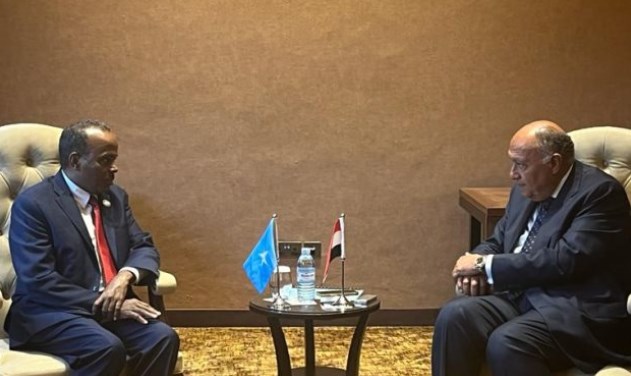
Press Photo
Minister of Foreign Affairs Sameh Shokry met Thursday with Ali Mohamed Omar, charge d’affaires of the Somalian foreign minister, in the Ugandan capital, Kampala, hosting the 19th summit of the Non-Aligned Movement.
Minister Shokry expressed Egypt’s solidarity with Somalia against attempts to breach its sovereignty, security and stability. He also stressed Egypt’s readiness to assist Somalia with human capacity-building, development plans and supporting its stability.
In turn, the Somalian official welcomed the statement released by the Arab League’s extraordinary session affirming solidarity with his country. He equally lauded the stances of many African states that back Somalia’s sovereignty and territorial integrity. Further, the two sides agreed on continuous consultation and coordination in the coming period.
In his speech at the Arab League’s extraordinary session, Minister Shokry pointed out Wednesday that certain parties aim for slowing down the journey of success the Somalian political leadership had embarked on by implicating the country in security and economic challenges.
The minister shed light on the previous Egyptian warnings about Ethiopia’s unilateral policies, which are violations of international law and the principle of good neighboring. He noted that Ethiopia’s recent signing of an agreement with the unrecognized state of Somaliland to have access to the Red Sea was a proof of the Egyptian viewpoint given that such practices increase tensions in the region.
Minister Shokry stipulated Egypt’s full support to Somalia, calling on all Arab and non-Arab states to express their respect to Somalia’s sovereignty and territorial integrity in alignment with the UN charter.
Somalia-Ethiopia tension revives memories of 1977
Somalia-Ethiopia tension revives memories of 1977

Source: BBC, Bushra Mohamed
Friday January 19, 2024
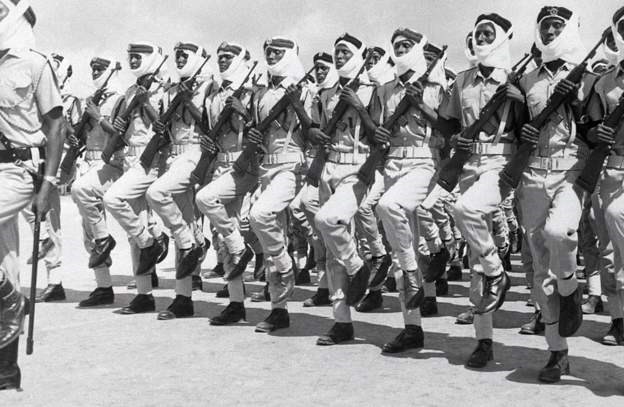
In this archive image Somali troops can be seen training during the 1977 war with Ethiopia
State media in Somalia have recently been broadcasting what some have described as an “incitement” song performed by the Somali police band.
It revives historical feelings of enmity towards Ethiopia in light of the controversial 1 January deal the country struck with the self-proclaimed republic of Somaliland.
The lyrics relate to a territorial war fought nearly 50 years ago – in 1977 – between Ethiopia and Somalia.
“If you don’t want peace, we will give you a chance to remember what we did to you in 1977,” says the song.
In that conflict, Somali soldiers went deep inside Ethiopia, capturing a huge swathe of the country before being beaten back by a better equipped Ethiopian army.
Both sides claim victory.
The song, called Remember What We Did to You in 1977, plus two others also relating to Ethiopia, have been widely shared across social media by Somalis.
Somaliland declared independence from Somalia in 1991, but this has not been recognised internationally.
The deal, which could see Somaliland leasing part of the coastline to Ethiopia, has caused profound offence in Somalia which sees this as Ethiopia as trying to take part of its sovereign territory.
Recently, Somalia’s President Hassan Sheikh Mohamud and the country’s prime minister have publicly said that their ancestors have fought Ethiopia for many generations and defended their country, and they are obliged to do the same.
‘’The person who is dividing our people is an enemy, they deserve resistance, we used to fight with them for generations, we’re the same people, we haven’t changed,” President Mohamud said.
The country’s leadership has also described Ethiopia as a threat to its national security.
U.S. Special Envoy warns Ethiopia-Somaliland deal jeopardizes anti-al-Shabaab campaign
U.S. Special Envoy warns Ethiopia-Somaliland deal jeopardizes anti-al-Shabaab campaign

Source: Hiiraan Online, Friday January 19, 2024
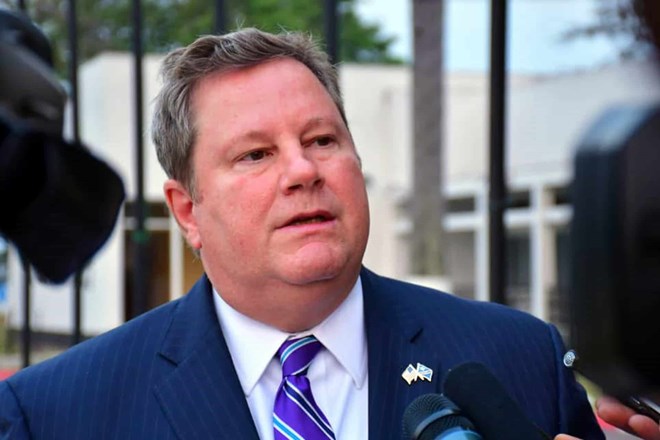
Mogadishu (HOL) – The United States has expressed concern over the recent Memorandum of Understanding (MoU) between Ethiopia and the breakaway Somaliland region, stating that it threatens the fight against al-Shabaab in Somalia.
Speaking at the extraordinary session of the IGAD Assembly of Heads of State and Government in Kampala on Thursday, U.S. Special Envoy for the Horn of Africa Mike Hammer mentioned that the United States recognizes the Federal Republic of Somalia’s sovereignty, unity, and territorial integrity, which includes Somaliland.
“We believe the status of Somaliland is an issue for Somalis, including Somalilanders, to decide. We are particularly concerned that the increase in tensions over the Memorandum of Understanding threatens to disrupt the fight that Somalis, along with Africans and regional and international partners – including the United States – are waging against al-Shabaab,” he said.
Ambassador Hammer urged Somalia and Ethiopia to avoid precipitous actions that could create opportunities for al-Shabaab to expand its reach.
The IGAD summit focused on the ongoing situation between the Ethiopia-Somalia and Sudan. IGAD strongly affirms the inalienable principle of protecting and preserving the independence, solidarity, and territorial integrity of the Federal Republic of Somalia.
Ambassador Hammer is expected to visit Addis Ababa from January 17 to 24.
CIA Director William Burns met with Somali President Hassan Sheikh Mohamud and Mahad Salad, the head of the Somali National Intelligence Agency, in Mogadishu on Wednesday. Burns discussed various issues, including critical points of the agreement between Ethiopia and Somaliland, “security cooperation, the fight against terrorism, and developments in the region.”
The ongoing crisis between Somalia and Ethiopia revolves around a controversial Memorandum of Understanding (MoU) signed on New Year’s Day. The agreement involves Ethiopia leasing a 20-kilometre coastal stretch in Somaliland for a commercial port and military base. The Somali government strongly opposes the deal, labelling it as “aggression” and a “clear violation of sovereignty.”
EU, AU, US say Sudan war and Somalia’s tension with Ethiopia threaten Horn of Africa’s stability
EU, AU, US say Sudan war and Somalia’s tension with Ethiopia threaten Horn of Africa’s stability

Source: AP, BY TOM ODULA
Friday January 19, 2024
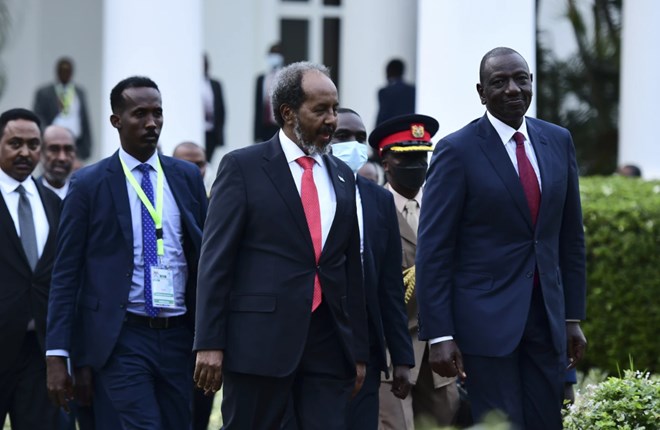
The African Union, European Union, and United States called Thursday for an immediate cease-fire and constructive dialogue between warring factions in Sudan.
The groups also called for an end to tension between Somalia and Ethiopia over an agreement signed between Ethiopia and Somalia’s breakaway region Somaliland.
Representatives of the groups, who spoke in Kampala, Uganda, after the meeting of an East African regional bloc, said that the two crises are threatening regional stability in the Horn of Africa.
Sudan’s armed forces and the rival Rapid Support Forces have been fighting for control of Sudan since April. Long-standing tensions erupted into street battles in the capital and other areas including the western Darfur region.
The AU, EU and U.S. and U.N noted that the fighting has displaced 7 million people and kept 19 million children out of school.
Michael Hammer, U.S. special envoy for the Horn of Africa, called on Sudan’s factions to adhere to their obligations under international humanitarian law and to fulfill recent commitments to stop fighting.
“It’s time for them to take action consistent with their stated claims that they want to stop the fighting and meet the needs of the people,” Hammer said.
He spoke after the regional bloc Intergovernmental Authority on Development, or IGAD, held an emergency meeting of heads of states in Kampala to discuss the Sudan war and rising tension between Somalia and Ethiopia.
Hammer said the leader of Sudan’s army, Gen. Abdel-Fattah Burhan, and the commander of the paramilitary Rapid Support Forces, Gen. Mohammed Hamdan Dagalo, who is known as Hemedti, must follow through on their promise at a Dec. 9 IGAD summit to reach an unconditional cease-fire.
“They will be responsible for the break up of Sudan if this conflict continues,” Hammer said.
The first step is an enforceable cease-fire that can be closely monitored, said Ramtane Lamamra, the U.N. envoy for Sudan.
“Guns must be silenced,” he said, adding that the war endangers “stability of the entire region and beyond.”
On Tuesday, the Sudanese government suspended ties with the east African regional bloc, accusing it of violating Sudan’s sovereignty by inviting the paramilitary leader to a summit. Hemedti attended Thursday’s summit in Kampala but did not speak.
Regarding Somalia, the AU, EU and U.S. said they recognize the country’s sovereignty, unity and territorial integrity, including the breakaway region of Somaliland.
Tension has been rising after land-locked Ethiopia signed an agreement on Jan. 1 with Somaliland to give it access to the sea. Somaliland in return expects Ethiopia soon to recognize the region as an independent state, which angers Somalia.
Hammer said the U.S. is particularly concerned that the tensions could undermine international-backed efforts to combat al-Qaida-linked militants in Somalia.
Annette Weber, the EU special envoy for the Horn of Africa, said the two crises have a common link with Red Sea, which she called a critical waterway carrying 10 percent of global cargo.
Weber also said there needs to be a collective response among Horn of Africa countries against attacks on ships by Yemen-based Houthi rebels.
Search continues for US navy SEALs missing near Somalia
Search continues for US navy SEALs missing near Somalia

Source: Tuesday January 16, 2024
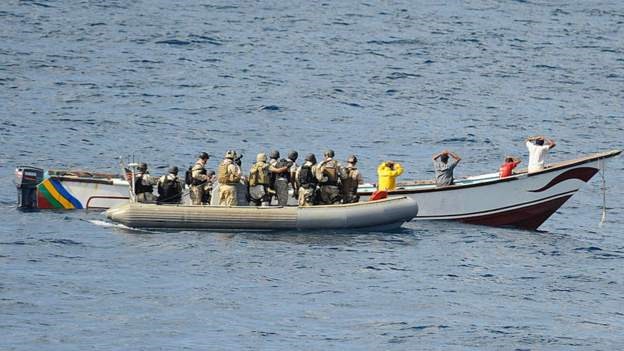
The SEALs went missing as they attempted to intercept a dhow carrying weapons (file photo)
The US navy is continuing its search for two navy SEALs who vanished off Somalia’s coast on Thursday night last week.
The navy is using ships and aircraft in the search operation that is under way in the Gulf of Aden.
The SEALs went missing as they attempted to intercept a dhow that was carrying weapons shipment, US defence officials have said.
One of the SEALs fell into the rough night-time waters while boarding the dhow, prompting the second SEAL to jump in after him for a rescue attempt.
Neither of them resurfaced.
The SEALs were part of a naval unit that has been intercepting weapons and other illegal shipments in the region, unrelated to the ongoing operation to protect vessels in the Red Sea from attacks by Yemen’s Houthis rebel group.
Saga of the UN Helicopter Downed in Al-Shabaab-controlled Part of Somalia
Saga of the UN Helicopter Downed in Al-Shabaab-controlled Part of Somalia
Source: The Washington Post published on 12 January 2024 an article titled “Crew of Crashed U.N. Helicopter Waited an Hour for Rescue before Kidnap” by Katharine Houreld.
A U.N. helicopter affiliated with the African Union peacekeeping mission crash landed this week in a section of Somalia controlled by al-Shabaab. Before a rescue team arrived, most of the nine persons on board were captured by al-Shabaab. A Somali doctor and Ugandan security officer reportedly escaped, and one person died. The crew consisted of four Ukrainians.
Ethiopia-Somaliland Deal, Position of China and US, and Red Sea Implications
Ethiopia-Somaliland Deal, Position of China and US, and Red Sea Implications
Source: The South China Morning Post published on 14 January 2024 an article titled “China Set to Stay on Neutral Ground as a Red Sea Storm Brews Over Ethiopia’s Port Deal with Somalia” by Jevans Nyabiage.
China supports the territorial integrity of Somalia and urges that countries in the Horn of Africa resolve their disagreement over the recent Ethiopia-Somaliland Memorandum of Understanding (MOU) through dialogue. The US position is similar. The MOU introduces, however, a new complicating factor in the politics of the countries in the Horn of Africa and those bordering the Red Sea.
Tensions Growing Between Ethiopia and Somalia
Tensions Growing Between Ethiopia and Somalia
Source: The Soufan Center, an independent and non-profit research organization based in New York, published on 11 January 2024 an intel brief titled “Tensions Growing Between Ethiopia and Somalia over Somaliland Port Deal.”
The analysis notes that the proposed deal is backed by the United Arab Emirates. On the other hand, the Organization of Islamic Cooperation, Arab League, Egypt, and Turkiye have sided with Somalia against the Ethiopia-Somaliland deal.

